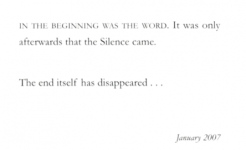version
Well-known member
American intellectuals didn't understand Baudrillard because they didn't understand America.
They should have read his book, America.
American intellectuals didn't understand Baudrillard because they didn't understand America.
American intellectuals didn't understand Baudrillard because they didn't understand America.
They should have read his book, America.
Jean had first come to America two years earlier, having been asked to teach at UCSD by the Marxist critic Fredric Jameson, who wanted to pick his brains. (Jean-François Lyotard and Louis Marin also taught there around this time.) At this early point in Jean’s career, Jameson’s gesture toward him was a thrilling invitation. And he had, by all accounts, a wonderful time: He fell passionately in love with the wife of another faculty member, and colleagues remember the pair walking barefoot in the halls of the French Department, holding hands like two flower children. But something did end up going wrong in the kingdom of San Diego: By the following year, Jean was no longer there and Jameson was warning his students against attending lectures given by “the French camp.”
Jean Baudrillard Did Not Care If She Was Your Wife.
It's true, Sontag's entire career is misinterpreted importations of midcentury French theoryAmerican intellectuals didn't understand Baudrillard because they didn't understand America.
Has anyone read Kafka's Amerika? Is it any good?They should have read his book, America.
This is incredible. The barefoot handholding part. Chef kiss. What went wrong do you know? Were the French just cassanovas?Jean had first come to America two years earlier, having been asked to teach at UCSD by the Marxist critic Fredric Jameson, who wanted to pick his brains. (Jean-François Lyotard and Louis Marin also taught there around this time.) At this early point in Jean’s career, Jameson’s gesture toward him was a thrilling invitation. And he had, by all accounts, a wonderful time: He fell passionately in love with the wife of another faculty member, and colleagues remember the pair walking barefoot in the halls of the French Department, holding hands like two flower children. But something did end up going wrong in the kingdom of San Diego: By the following year, Jean was no longer there and Jameson was warning his students against attending lectures given by “the French camp.”
This is incredible. The barefoot handholding part. Chef kiss. What went wrong do you know? Were the French just cassanovas?

What else did he say?
I reread this closely and I think he's confused about almost everything, but I appreciate his style and subject matterA Model Material: Glass
In my regrettable mistake of studying film instead of philosophy I am extremely behind on, well, where I feel I ought to be in "thought" compared to my peers, and Baudrillard is one of the thinkers they all talk about a lot.
Is S&S the best place to start?
You should read my mighty works instead, they're like Jean Baudrillard in subject and style, but the treatment and ideas are much betterIs S&S the best place to start? In my regrettable mistake of studying film instead of philosophy I am extremely behind on, well, where I feel I ought to be in "thought" compared to my peers, and Baudrillard is one of the thinkers they all talk about a lot.
This definitely tracks with my experience, the stakes around understanding Deleuze here are extremely high.I've heard the French stuff's more common studying film, media, literature, art and architecture than on actual philosophy courses. The people I know who had to read Deleuze at uni were doing art and film and the guy I know who did philosophy never went anywhere that sort of thing.


If we look closely, we see that the real world begins, in the modern age, with the decision to transform the world, and to do so by means of science, anaIytical knowledge and the implementation of technology – that is to say that it begins, in Hannah Arendt’s words, with the invention of an Archimedean point outside the world (on the basis of the invention of the telescope by Galileo and the discovery of modern mathematical calculation) by which the natural world is definitively alienated. This is the moment when human beings, while setting about analyzing and transforming the world, take their leave of it, while at the same time lending it force of reality. We may say, then, that the real world begins, paradoxically, to disappear at the very same time as it begins to exist.

